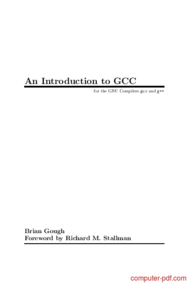An Introduction to GCC
The GNU Compiler Collection (GCC) is the backbone of C and C++ development, powering everything from embedded systems to high-performance applications. An Introduction to GCC is a practical guide that goes beyond language syntax to teach you how to compile, debug, and optimize code effectively using gcc and g++. Unlike traditional programming books, this resource focuses on the compiler toolchain, addressing common pitfalls and providing clear solutions for beginners and intermediate developers alike.
Learning the An Introduction to GCC
The book begins with compilation basics, explaining how to transform source code into executables using GCC. You'll learn to navigate header files, libraries, and linker options, with step-by-step examples for both C and C++ programs. A dedicated section on warning options (-Wall, -Wextra) demonstrates how to catch potential bugs early, while preprocessor directives (#include, #define) are demystified for macro management. These foundational skills are crucial for troubleshooting build errors and writing portable code across platforms.
Debugging is a core focus, with detailed coverage of GDB (GNU Debugger) and compiler flags like -g for symbol generation. The book teaches you to interpret common error messages—from undefined references to segmentation faults—and provides strategies for static and dynamic linking (.a vs. .so files). For performance-critical applications, the optimization chapter explores GCC flags like -O1, -O2, and -O3, alongside platform-specific tuning for x86, ARM, and other architectures.
Advanced topics include profiling with gprof to identify bottlenecks and coverage testing with gcov to ensure code quality. The guide also clarifies environment variables (PATH, LD_LIBRARY_PATH) and search paths, helping you resolve "file not found" issues during compilation. For C++ developers, there’s a deep dive into template instantiation and STL usage with GCC, including quirks of the C++ standard library implementation.
What sets this book apart is its problem-solving approach. Each concept is paired with "Hello World" examples that evolve to demonstrate real-world scenarios, like multi-file projects or third-party library integration. The troubleshooting sections are particularly valuable, offering fixes for cryptic linker errors or memory leaks. Whether you're compiling kernel modules or cross-platform applications, these insights streamline your workflow.
By the end, you'll not only master GCC’s features but also adopt best practices for efficient development. From debugging segmentation faults to optimizing runtime performance, this tutorial transforms GCC’s complexity into an asset. Ideal for students, hobbyists, and professionals, it’s the missing manual for anyone serious about C/C++ programming with GNU tools.
| Description : | Download course An Introduction to GCC: for the GNU Compilers gcc and g++, free PDF ebook by Brian Gough. |
| Level : | Intermediate |
| Created : | December 2, 2021 |
| Size : | 519.51 KB |
| File type : | |
| Pages : | 124 |
| Author : | Brian Gough |
| Licence : | GFDL |
| Downloads : | 282 |
